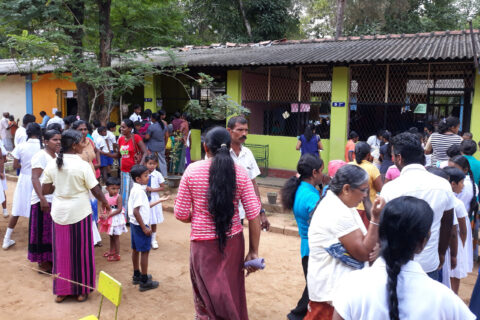Collaboration with National Hospital Kandy for kidney research

For just over twenty years now, physicians have observed a significant rise in chronic kidney disease in countries on the Equator. It is a major worry that this may be a global phenomenon with an as yet unknown cause.
Researchers from Berlin and Erlangen are supporting important kidney research in Sri Lanka.
Researchers from Uniklinikum Erlangen, Friedrich-Alexander-Universität Erlangen-Nürnberg and Charité – Universitätsmedizin Berlin are now supporting the team of a newly established research center in Sri Lanka. “We have entered into a partnership with the National Hospital Kandy,”reports Prof. Dr. Christoph Daniel, head of the research laboratory at the Department of Nephropathology (head Prof. Dr. Kerstin Amann) at Uniklinikum Erlangen. “Our common goal is to identify risk factors for the occurrence and progression of these chronic kidney diseases with no obvious cause. That is the first step on the long pathway towards prevention and cure.”
In Sri Lanka in the last twenty years, it is estimated that 20,000 have died of chronic kidney disease of unknown etiology/uncertain cause, in brief: CKDu) and thousands more are affected. “It is striking that other countries around the Equator have reported similar epidemics of chronic kidney disease, which suggests that CKDu could be a global phenomenon,” explains Prof. Daniel. “The pathogenesis of CKDu, in other words what causes the onset and the progression of the disease, is still unclear.” As CKDu is particularly prevalent in hot regions, medical experts are considering heat stress, drinking water quality and repeated dehydration as possible causes. However, a role may also be played by organic toxins and infectious diseases.
In 2018, National Hospital Kandy opened a new building housing the research center. Since then, the team has established the center’s reputation with dedicated field research in rural Sri Lanka and collaborations with national and international partners. Now, international collaboration must be intensified in order to allow the research center to become a central hub for CKDu research. “We would particularly like to support our colleagues in implementing structural, teaching and collaborative measures,” explains Christoph Daniel.
Stakeholders from Germany and Sri Lanka
Partners from Germany involved in the project are Prof. Dr. Kerstin Amann and Prof. Daniel from the Department of Nephropathology at Uniklinikum Erlangen, Prof. Dr. Johannes Barth, Chair of Applied Geology at FAU Erlangen-Nürnberg, and Prof. Dr. Philipp Enghard, deputy head of department at the Department of Nephrology and Medical Intensive Care
– Universitätsmedizin Berlin. In Sri Lanka , the team consists of Dr. Nishantha Nanayakkara (Department of Nephrology/National Hospital Kandy), Prof. Dr. Shirani Ranasinghe (Department of Biochemistry/University of Peradeniya), Prof. Dr. Rohana Chandrajith (Department of Geology/University of Peradeniya) and Prof. Dr. Sulochana Wijetunge (Department of Pathology/University of Peradeniya).
Further information:
Prof. Dr. Christoph Daniel
Phone: +49 9131 85 32621
christoph.daniel@uk-erlangen.de